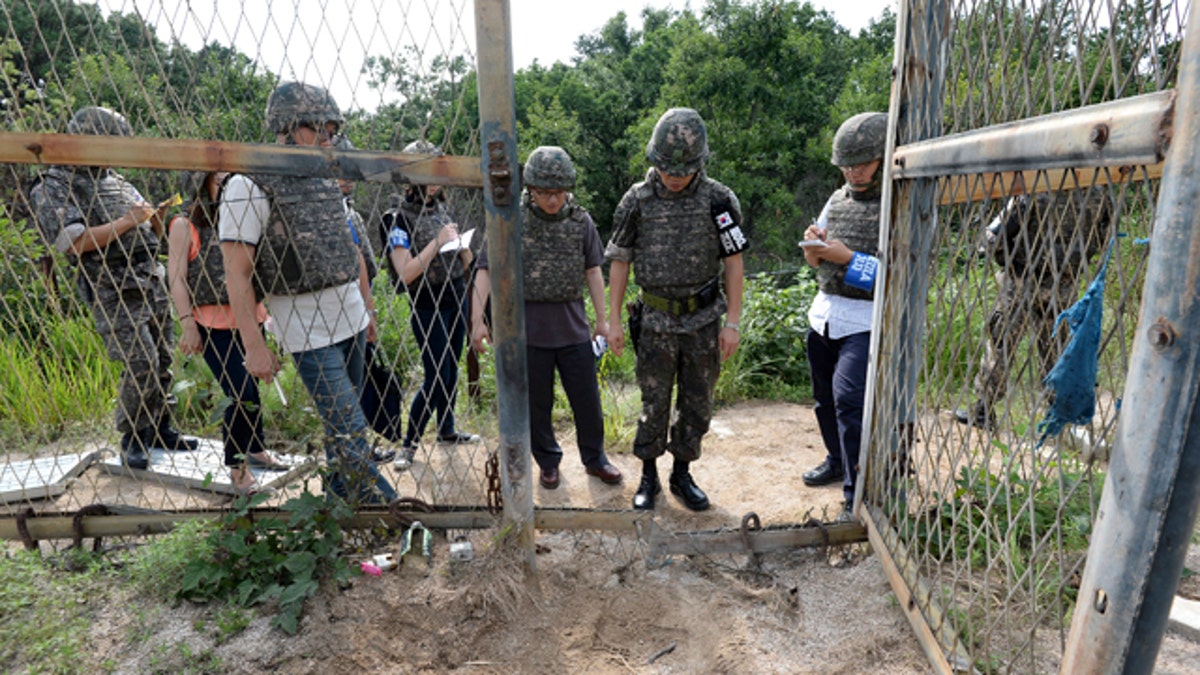
FILE - In this Aug. 9, 2015 file photo provided by the Defense Ministry, an unidentified South Korean army official, second from right, gives a briefing to the media at the scene of a blast inside the demilitarized zone in Paju, South Korea. (The Defense Ministry via AP, FIle)
SEOUL, South Korea – North Korea insisted Tuesday that its recent expression of "regret" over a mine explosion that maimed two South Korean soldiers was not an apology, as Seoul claims it was -- throwing doubt on tentative moves toward detente between the rivals.
The statement by Pyongyang's powerful National Defense Commission is the first explicit denial of Seoul's interpretation of the key part of an accord that came last week after marathon negotiations allowed the Koreas to step back from escalating threats of war.
While previous comments by officials had signaled that North Korea did not see its expression of regret for the injuries as an apology, let alone as acknowledgement of responsibility, the vehemence of Tuesday's denial, coupled with it coming from the highest decision-making body in the country, muddies the prospects for better ties between the Koreas, which remain in a technical state of war.
The accord had been vague enough to give both sides seemingly what they wanted.
South Korea immediately interpreted it publicly as a mini-breakthrough, claiming that it successfully pushed the North to take responsibility for the blast. North Korea got an end to the cross-border propaganda broadcasts Seoul had started after it said it had evidence that the North had planted the mines. Both sides began making plans for more talks and to resume reunions of families separated by war.
North Korea's new statement, however, is a clear warning.
"This kind of interpretation is the result of ignorance on the meaning of a Korean word and its concept," said the statement issued by an unidentified spokesman at the commission's policy department.
"South Korea must not forget for an instant that a misjudgment ... would trigger fatal consequences on North-South relations," it went on. "Nothing can be cruder and un-handsomer than describing as one side's unilateral victory a joint statement that North and South Korea agreed upon."
The two Koreas have a history of failing to follow through on past attempts at reconciliation, and their ties have been bad since conservatives took power in Seoul in early 2008.
The North's statement, carried by the official Korean Central News Agency, also criticized South Korea's live-fire drills with the U.S. last week, saying they showed the South's belligerence and threatened to scuttle chances for improving ties. South Korean defense officials said the drills, the biggest-ever of their kind, were routine training between the allies.
South Korea's Unification Ministry spokesman Jeong Joon-hee said later Tuesday it's time for the two Koreas to faithfully try to implement their agreements rather than arguing over wording in them.
In an indication that North Korea's hard-line stance hasn't changed despite the agreement, North Korean leader Kim Jong Un said last week that the deal was achieved not on the negotiating table but thanks to his country's military capability based on its "nuclear deterrent." The North's statement Tuesday reiterated Kim's stance.
